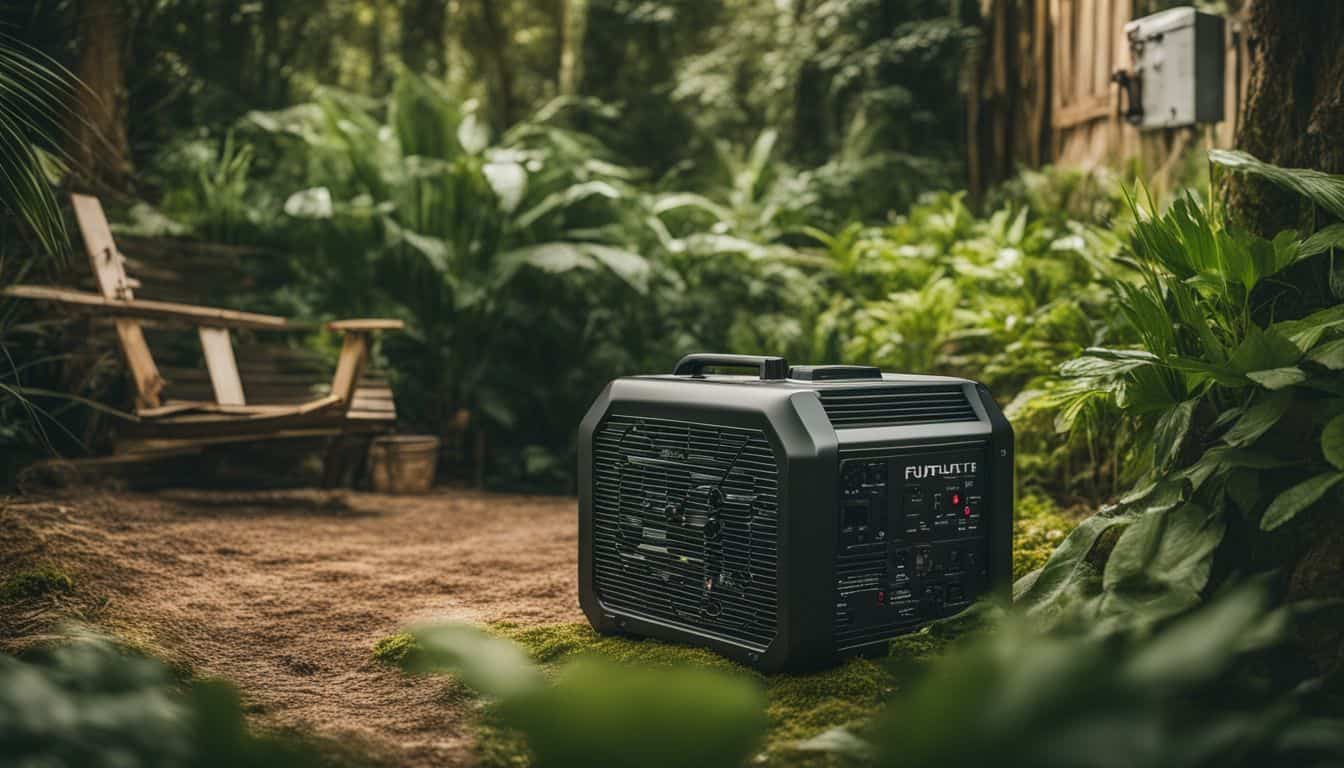As the awareness of environmental issues has increased, the environmental impact of portable generators has become a pressing concern. This guide explores strategies to minimize the ecological footprint of these vital power sources, ensuring that we can meet our energy needs responsibly while preserving our planet for future generations.
For those new to portable generators, our article on the basics of portable generators explained provides a solid foundation for understanding these devices.
Understanding the Environmental Impact
Portable generators, while invaluable in many situations, can have significant environmental consequences that extend beyond their immediate use:
- Emissions and Air Pollution: Traditional gas-powered generators emit carbon dioxide, carbon monoxide, and other pollutants that contribute to air pollution and climate change. These emissions can have both local and global impacts, affecting air quality in the immediate vicinity and contributing to broader environmental issues.
- Noise Pollution: The loud operation of many generators can disrupt wildlife and human communities. This noise pollution can have far-reaching effects on ecosystems, interfering with animal communication and behavior and causing stress in wildlife and human populations.
- Fuel Consumption: Generators often rely on non-renewable fossil fuels, contributing to resource depletion. This impacts the availability of these finite resources and contributes to the environmental issues associated with fuel extraction and transportation.
- Waste Generation: Used oil, filters, and old generators can create hazardous waste if disposed of improperly. This waste can contaminate soil and water sources, posing environmental and human health risks.
Choosing Eco-Friendly Generator Options
Selecting environmentally friendly generator options can significantly reduce your ecological footprint:
- Inverter Generators: These are more fuel-efficient and produce fewer emissions than traditional generators. They achieve this by adjusting engine speed to match power demand, resulting in less fuel consumption and reduced environmental impact.
- Solar-Powered Generators: Harnessing renewable solar energy, these generators produce zero emissions during operation. They offer a clean, sustainable power solution, especially effective in sunny climates or for low to moderate power needs.
- Propane and Natural Gas Generators: These burn cleaner than gasoline, producing fewer emissions. While still fossil fuels, they offer a cleaner alternative to traditional gasoline generators, with reduced air pollutants and greenhouse gas emissions.
- Biodiesel Generators: Using renewable biodiesel fuel can reduce carbon emissions compared to traditional diesel. Biodiesel is produced from renewable resources such as vegetable oils or animal fats, offering a more sustainable fuel option.
Optimizing Generator Efficiency
Maximizing efficiency is key to reducing environmental impact:
- Proper Sizing and Load Management: Choose a generator that matches your power needs to avoid wasting fuel. Oversized generators running at low loads are inefficient and produce unnecessary emissions.
- Regular Maintenance: Keep your generator in top condition through regular servicing to ensure optimal performance and fuel efficiency. This includes regular oil changes, air filter replacements, and tune-ups as recommended by the manufacturer.
- Using Energy-Efficient Appliances: Pair your generator with energy-efficient devices to reduce overall power consumption. This not only reduces fuel use but also allows for the use of smaller, more efficient generators.
Implementing Best Practices for Operation
How you use your generator can significantly affect its environmental impact:
- Limit Runtime: Only run your generator when necessary to reduce emissions and fuel consumption. Consider using timers or smart controls to automate generator operation based on actual power needs.
- Proper Placement: Ensure good ventilation to improve efficiency and reduce the risk of carbon monoxide buildup. This not only enhances safety but also allows the generator to operate more efficiently, reducing fuel consumption and emissions.
- Use Fuel Stabilizers: When storing your generator, use fuel stabilizers to prevent fuel degradation and reduce waste. This extends the life of the fuel and prevents the need for frequent fuel replacements, reducing overall consumption.
Exploring Alternative Power Solutions
Consider alternatives to traditional generators:
- Battery Storage Systems: These can store energy from the grid or renewable sources for later use, eliminating emissions during power delivery. Advanced battery technologies are making this option increasingly viable for a wide range of applications.
- Renewable Energy Sources: Solar panels or small wind turbines can provide clean, renewable energy. These can be used independently or in conjunction with battery storage for a reliable, eco-friendly power solution.
- Hybrid Systems: Combining generators with renewable sources can provide reliable power while minimizing environmental impact. These systems can intelligently switch between power sources based on availability and demand, optimizing efficiency and reducing reliance on fossil fuels.
Proper Disposal and Recycling
Responsible end-of-life management is crucial:
- Oil and Filter Disposal: Always dispose of used oil and filters at approved recycling centers. Many auto parts stores and service centers offer recycling services for these items.
- Recycling Old Generators: Many components of old generators can be recycled, reducing waste in landfills. This includes metals, plastics, and electronic components. Research local recycling facilities that accept power equipment.
- Battery Disposal: Ensure proper disposal of batteries, especially from solar generators, to prevent environmental contamination. Many retailers and recycling centers offer battery recycling programs.
Regulatory Compliance and Standards
Stay informed about and comply with relevant regulations:
- Emissions Regulations: Ensure your generator meets local and national emissions standards. These regulations are designed to limit air pollution and protect public health.
- Noise Ordinances: Be aware of and adhere to local noise regulations when operating your generator. Many communities have specific rules about when and how loud generators can be operated.
- Fuel Efficiency Standards: Choose generators that meet or exceed fuel efficiency standards. These standards are continually evolving to promote more environmentally friendly power generation.
Future Trends in Eco-Friendly Portable Power
The future of portable power looks promising for the environment:
- Advancements in Generator Technology: Expect to see more efficient, cleaner-running generators in the future. This includes improvements in engine design, fuel injection systems, and exhaust treatment technologies.
- Integration with Smart Grid Systems: Smart generators that can communicate with the grid to optimize power usage are on the horizon. These systems could potentially feed excess power back into the grid, enhancing overall energy efficiency.
- Emerging Sustainable Fuel Options: Research into hydrogen fuel cells and other clean energy sources may revolutionize portable power generation. These technologies promise zero-emission power generation with high efficiency.

Conclusion
Minimizing the environmental impact of portable generators requires a multifaceted approach, from choosing eco-friendly options and optimizing efficiency to exploring alternatives and ensuring proper disposal. By implementing these strategies, we can harness the benefits of portable power while minimizing our ecological footprint.
For tips on efficient power distribution, check out our guide on portable generator setups for efficient power distribution.
FAQs
What are some of the negative environmental impacts of portable generators?
Portable generators can harm the environment in several ways:
- They emit polluting gases like carbon monoxide that contribute to climate change
- Burning fossil fuels in generators releases particulate matter and other air pollutants
- Spills of gasoline or diesel fuel used in generators can contaminate soil and water
What are some simple steps to minimize the environmental impact when using a portable generator?
To reduce the environmental harm from portable generators:
- Choose a generator that matches your power needs to avoid wasting fuel
- Keep the engine well-maintained so it runs efficiently
- Use clean alternative fuels like biodiesel when possible
- Recycle old batteries, filters, and engine components to prevent pollution
- Consider switching to renewable power sources like solar to eliminate emissions
How can using the right size generator help the environment?
Using a portable generator that provides the amount of power you need, without being oversized, allows the engine to run more efficiently. A properly sized generator will burn less fuel and emit fewer pollutants compared to running a large generator for small jobs.
What maintenance practices make generators more environmentally friendly?
Performing regular tune-ups and maintenance on portable generators keeps the engine running at peak efficiency. A well-maintained engine will consume fuel more completely, producing less pollution and waste compared to a poorly tuned engine.
What are the environmental benefits of using biodiesel in generators?
Biodiesel and other clean alternative fuels produce fewer harmful emissions when burned in portable generators compared to conventional diesel. Using biodiesel when possible can reduce the generator’s contribution to air pollution and climate change.
How does recycling old generator components help protect the planet?
Recycling the batteries, filters, engine oil and other components from portable generators prevents toxic substances from contaminating the environment. Proper recycling ensures hazardous waste is disposed of safely instead of polluting soil and water.
What makes solar generators an eco-friendly choice?
Solar-powered generators produce electricity without any fuel combustion or emissions. By using free, renewable energy from the sun, solar generators avoid the air pollution and greenhouse gases released by diesel and gas-powered generators.

Leave a Reply